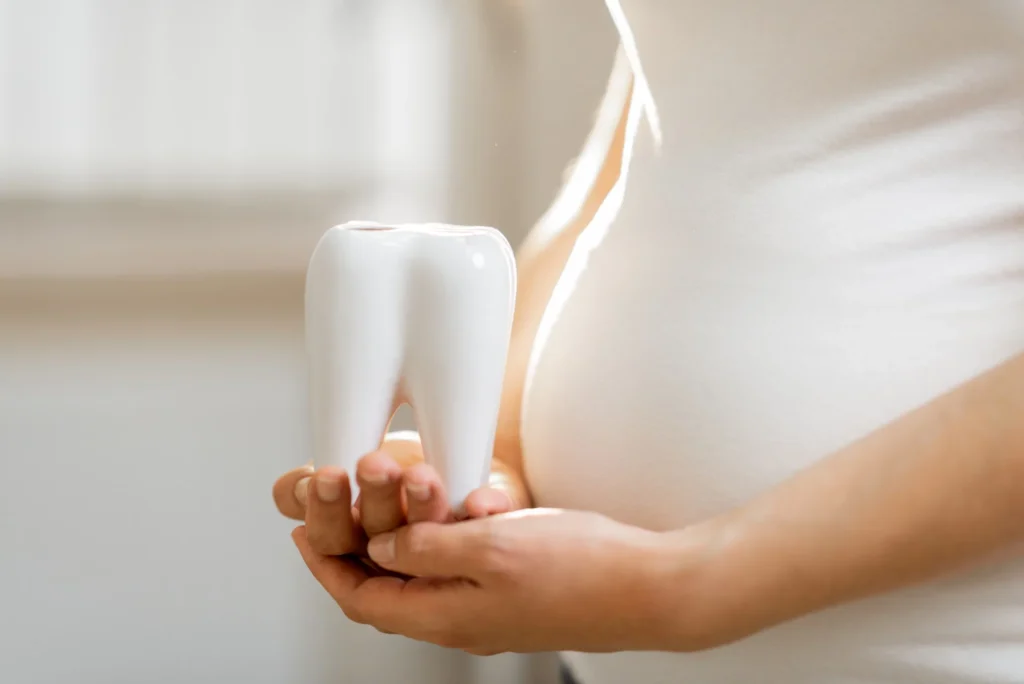Physical Address
304 North Cardinal St.
Dorchester Center, MA 02124
Physical Address
304 North Cardinal St.
Dorchester Center, MA 02124

Oral Health During Pregnancy: The Importance of Prenatal Dental Care. Learn the importance of prenatal dental care and how to maintain oral health during pregnancy.
Maintaining good oral health during pregnancy is crucial for both the expectant mother and the developing baby. Hormonal changes during pregnancy can lead to an increased risk of dental issues such as gum disease and tooth decay. Untreated oral health problems can have significant repercussions, potentially contributing to pregnancy complications like preterm birth and low birth weight.

Regular dental check-ups and cleanings are essential for expectant mothers to prevent and detect dental issues early on. Preventive dental care not only promotes the mother’s oral health but also supports the overall well-being of both mother and baby. Neglecting dental care during pregnancy can pose risks not just for oral health, but also for the pregnancy itself. By prioritizing oral hygiene and seeking professional dental care, expectant mothers can safeguard their own health and that of their baby.
During pregnancy, hormonal fluctuations can have a notable impact on a woman’s oral health. Elevated levels of progesterone and estrogen can lead to an increase in blood flow to the gums, causing them to become more susceptible to inflammation and bleeding. This condition, known as pregnancy gingivitis, affects a significant number of expectant mothers. Furthermore, hormonal changes can also alter the body’s response to plaque, potentially resulting in a higher risk of developing cavities during this time. It is essential for pregnant women to be mindful of these changes and prioritize their oral hygiene routine to mitigate any adverse effects on their dental health.
In addition to pregnancy gingivitis and increased cavity risk, hormonal shifts can contribute to the development of pregnancy tumors in some women. These benign growths typically appear on the gums, often between teeth, and while they are non-cancerous and usually painless, they can cause discomfort and may require professional intervention. Pregnant individuals may also notice a heightened sensitivity to taste or an increase in salivary flow, which can impact their overall oral health experience. Understanding the influence of hormonal changes on oral health can empower expectant mothers to take proactive steps in maintaining a healthy mouth throughout their pregnancy journey.
Pregnancy is a beautiful and transformative period in a woman’s life, but it can also bring about certain oral health challenges. One common dental issue that expectant mothers may face is pregnancy gingivitis. Hormonal changes during pregnancy can make gums more sensitive to plaque, leading to inflammation, tenderness, and bleeding. This condition underscores the importance of maintaining good oral hygiene habits and attending regular dental check-ups to prevent further complications.
| Dental Issue | Description |
|---|---|
| Gingivitis | Hormonal changes during pregnancy can increase the risk of gingivitis, characterized by inflamed and tender gums. |
| Pregnancy Tumors | Some pregnant women may develop pregnancy tumors, which are non-cancerous growths on the gums caused by hormonal changes. These usually regress after childbirth. |
| Tooth Decay | Changes in diet, increased acidity in the mouth, and morning sickness can contribute to tooth decay during pregnancy. |
| Periodontal Disease | Pregnancy hormones can affect the body’s response to bacteria, potentially increasing the risk of periodontal disease. |
| Tooth Erosion | Increased acidity in the mouth due to morning sickness or dietary changes can lead to tooth erosion during pregnancy. |
| Pregnancy-associated Pyogenic Granuloma | Pyogenic granulomas are benign growths that can occur on the gums during pregnancy, usually due to hormonal changes. |
| Dry Mouth | Some pregnant women may experience dry mouth, which can increase the risk of tooth decay and oral discomfort. |
Another prevalent dental concern during pregnancy is tooth decay. This can be exacerbated by cravings for sugary foods and morning sickness, which may expose teeth to stomach acid, increasing the risk of enamel erosion and cavities. Expectant mothers should be vigilant about their dietary choices and oral care routines to safeguard their dental health during this critical period.
Regular dental check-ups during pregnancy are crucial for maintaining optimal oral health for both the mother and the developing baby. These routine visits allow dentists to monitor any changes or issues that may arise due to hormonal fluctuations during pregnancy, such as pregnancy gingivitis or increased risk of tooth decay. By proactively addressing these concerns, expectant mothers can prevent more severe dental problems that could potentially impact their overall health.
In addition to addressing immediate dental issues, regular check-ups during pregnancy also enable dentists to provide personalized oral care recommendations tailored to the unique needs of expectant mothers. From dietary advice to tips on managing morning sickness-related enamel erosion, these visits serve as a valuable opportunity for pregnant women to learn how to best care for their teeth and gums during this critical time. Ultimately, by prioritizing regular dental check-ups throughout pregnancy, women can safeguard their oral health and contribute to a healthier start for their newborn.
Expectant mothers should prioritize preventive dental care during pregnancy to safeguard their oral health and overall well-being. Pregnancy hormones can increase the risk of developing oral health issues such as gum disease and tooth decay. As a result, regular dental check-ups and cleanings are essential to monitor and maintain oral health throughout pregnancy. Preventive measures like professional cleanings, fluoride treatments, and dental exams can help prevent more serious dental problems from occurring, ensuring the health of both mother and baby.

Research has shown a clear link between poor oral health during pregnancy and adverse pregnancy outcomes, including preterm birth and low birth weight. By proactively seeking preventive dental care, expectant mothers can reduce the likelihood of experiencing complications during pregnancy. Additionally, practicing good oral hygiene habits at home, such as brushing twice a day, flossing, and eating a balanced diet, complements professional dental care and contributes to a healthy oral environment. Taking a proactive approach to preventive dental care not only benefits the mother but also sets the foundation for the child’s future oral health.
Gum disease, also known as periodontal disease, is a common oral health issue that can have significant implications for pregnant women. Research has shown a clear link between gum disease and various pregnancy complications. Pregnant women with untreated gum disease are at a higher risk of experiencing problems such as preterm birth, low birth weight, and preeclampsia. The inflammation and bacteria associated with gum disease can trigger an immune response that may interfere with the normal development of the fetus, leading to these serious complications.
| Link Between Gum Disease and Pregnancy Complications | Description |
|---|---|
| Increased Risk of Preterm Birth | Pregnant women with untreated gum disease may have an increased risk of delivering preterm (before 37 weeks), which can lead to various health complications for the baby. |
| Low Birth Weight | Gum disease during pregnancy has been associated with an increased likelihood of delivering a low birth weight baby, which can pose health risks and developmental challenges. |
| Preeclampsia | Research suggests a potential link between periodontal disease and preeclampsia, a serious condition characterized by high blood pressure and other complications during pregnancy. |
| Gestational Diabetes | Some studies indicate an association between gum disease and gestational diabetes, a condition that can lead to complications for both the mother and the baby during pregnancy. |
| Increased Risk of Miscarriage | While research findings vary, some studies suggest a potential link between gum disease and an increased risk of miscarriage or pregnancy loss. |
| Elevated Inflammatory Response | Periodontal disease can trigger an inflammatory response in the body, potentially affecting pregnancy outcomes by increasing the risk of various complications. |
Moreover, the hormonal changes that occur during pregnancy can exacerbate existing gum disease or increase the likelihood of developing it. Progesterone levels rise during pregnancy, making gum tissue more sensitive to plaque bacteria. This can result in a condition known as pregnancy gingivitis, characterized by red, swollen, and tender gums. Without proper oral hygiene and regular dental care, pregnancy gingivitis can progress to more severe forms of gum disease, posing a greater threat to both maternal and fetal health.
Dental care is crucial for expectant mothers, and it is important to address any oral health issues during pregnancy. Safe dental treatments for pregnant women are available to ensure optimal oral hygiene without compromising the health of the mother or the developing baby. Routine dental procedures such as cleanings, fillings, and root canals can be safely performed during pregnancy, especially during the second trimester when the risks are minimal.
It is important for pregnant women to inform their dentist about their pregnancy status and ensure that all necessary precautions are taken during dental treatments. Dental x-rays should be avoided during pregnancy, especially during the first trimester when the baby’s organs are developing. Local anesthesia and medications used in dental procedures are generally safe for pregnant women, but consulting with healthcare providers and dentists is advisable to determine the most suitable treatment options. Prioritizing oral health during pregnancy not only benefits the mother but also contributes to the overall health and well-being of the baby.
During pregnancy, maintaining proper nutrition is not only essential for the overall health of the mother and the developing baby but also plays a significant role in promoting healthy teeth and gums. A balanced diet rich in vitamins and minerals, such as calcium, vitamin C, and vitamin D, can help support the health of teeth and gums. Calcium is crucial for the development of strong teeth and bones, while vitamin C is essential for healthy gum tissue. Incorporating foods like dairy products, leafy greens, citrus fruits, and fortified cereals can provide the necessary nutrients to support oral health during pregnancy.

Furthermore, it is important to limit the consumption of sugary and acidic foods and beverages, as they can contribute to dental issues such as tooth decay and erosion. Excessive sugar intake can lead to the formation of cavities, while acidic foods and drinks can wear down tooth enamel, increasing the risk of dental problems. Opting for water or milk as the primary beverage and choosing nutritious snacks like fruits, vegetables, and nuts can help maintain a healthy balance and support optimal oral health for expectant mothers.
Maintaining good oral hygiene during pregnancy is crucial for both the mother and the baby’s health. Brushing your teeth twice a day with fluoride toothpaste and flossing daily can help prevent common dental issues such as gum disease and tooth decay. Using an antimicrobial mouthwash can also aid in reducing bacteria in the mouth.
In addition to regular brushing and flossing, it’s essential to maintain a balanced diet rich in nutrients essential for oral health. Consuming foods high in calcium, vitamin C, and phosphorus can strengthen the teeth and gums. Avoiding sugary snacks and drinks can also help prevent dental problems. Drinking plenty of water throughout the day can further support oral health by washing away food particles and maintaining saliva production, which helps neutralize acids in the mouth.
Regular dental cleanings and exams play a vital role in maintaining optimal oral health for expectant mothers. Pregnancy brings about significant hormonal changes that can make women more susceptible to dental issues such as gum disease and tooth decay. By attending these routine appointments during pregnancy, dentists can closely monitor oral health status, provide professional cleanings to remove plaque and tartar buildup, and address any emerging concerns promptly.
Studies have shown a clear link between poor oral health during pregnancy and adverse outcomes such as premature birth, low birth weight, and preeclampsia. Therefore, prioritizing regular dental cleanings and exams is not only essential for the mother’s well-being but also for the overall health of the developing baby. Preventive dental care in the form of cleanings and exams can help prevent the progression of dental problems, promote healthy gums and teeth, and contribute to a smoother pregnancy journey.
Neglecting dental care during pregnancy can lead to a multitude of potential risks that can affect both the mother and the developing baby. One significant risk is the increased likelihood of developing pregnancy gingivitis, a condition characterized by inflammation of the gums. Hormonal changes during pregnancy can make gums more susceptible to plaque buildup, leading to redness, swelling, and tenderness. If left untreated, pregnancy gingivitis can progress to periodontal disease, which is associated with complications such as premature birth and low birth weight. Maintaining good oral hygiene practices and regular dental check-ups are crucial in preventing the progression of gingivitis to more severe oral health conditions.
Moreover, neglecting dental care during pregnancy can also exacerbate existing dental issues or lead to the development of new problems. Tooth decay is a common issue that can worsen if proper oral hygiene measures are not followed. Furthermore, untreated dental infections can spread to other parts of the body, potentially posing risks to the overall health of the mother and the baby. Seeking timely dental treatment and adhering to preventive care measures can help mitigate these risks and promote better oral health outcomes during pregnancy.
Dentists play a crucial role in supporting prenatal oral health by providing specialized care tailored to the unique needs of expectant mothers. By offering guidance on maintaining good oral hygiene practices and addressing any dental concerns promptly, dentists can help prevent potential complications during pregnancy related to oral health. Regular dental check-ups during pregnancy can aid in early detection and treatment of dental issues, promoting overall well-being for both the mother and the developing baby.
Moreover, dentists can recommend safe and appropriate dental treatments for pregnant women, ensuring that necessary interventions are carried out without jeopardizing the health of the mother or the baby. Through detailed assessments and personalized advice, dentists contribute significantly to the preventive care that is essential for expectant mothers, fostering a supportive environment for optimal oral health outcomes during pregnancy.
Dental anxiety during pregnancy is a common concern that may prevent expectant mothers from seeking necessary dental care. The fear of potential discomfort, harmful effects on the baby, or the unknown can all contribute to heightened anxiety levels. However, it is essential to address these fears and misconceptions to ensure the oral health of both the mother and the developing baby. Dentists can play a crucial role in helping pregnant women manage their anxiety by providing a supportive and understanding environment during dental visits. Open communication about procedures, potential risks, and safety measures can help alleviate fears and build trust between the patient and the dental care provider.
Moreover, exploring relaxation techniques such as deep breathing, guided imagery, or listening to soothing music during dental appointments can help pregnant women manage their anxiety effectively. Creating a calm and comforting atmosphere in the dental office, along with taking breaks between procedures if needed, can contribute to a more positive experience for expectant mothers. By addressing dental anxiety proactively and tailoring the dental care approach to the specific needs and concerns of each patient, dentists can support pregnant women in maintaining optimal oral health throughout their pregnancy journey.
Maintaining good oral health during pregnancy is crucial for the overall well-being of both the mother and the baby. Hormonal changes during pregnancy can lead to an increased risk of developing dental issues such as gingivitis and pregnancy tumors. It is essential for expectant mothers to maintain a thorough oral hygiene routine by brushing twice a day with fluoride toothpaste, flossing daily, and using antimicrobial mouthwash to prevent these conditions.
Regular dental check-ups are highly recommended during pregnancy to detect and address any oral health issues promptly. These visits not only help in preventing dental problems but also provide an opportunity for the dentist to discuss the importance of oral health during pregnancy and address any concerns the expectant mother may have. Professional cleanings and exams can help ensure that any potential issues are identified early and treated effectively, promoting a healthy and happy pregnancy journey for both the mother and the baby.
Maintaining good oral health during pregnancy is crucial for promoting overall wellness for both the mother and the baby. Hormonal changes during pregnancy can lead to an increased risk of gum disease and other dental issues if not properly addressed. Regular dental check-ups can help in early detection and prevention of any potential oral health problems, ensuring a healthy pregnancy. Preventive dental care plays a significant role in supporting expectant mothers, as it not only reduces the risk of pregnancy-related complications linked to gum disease but also promotes better overall well-being during this critical phase.
Furthermore, dental cleanings and exams are essential components of prenatal dental care as they help in keeping the oral cavity healthy and free from potential infections. Neglecting dental care during pregnancy can pose risks not only to the mother’s oral health but also to the baby’s well-being. Dentists play a vital role in educating and supporting expectant mothers in maintaining optimal oral hygiene practices throughout their pregnancy. By addressing dental anxiety, providing safe treatments, and offering nutritional guidance, dentists contribute to enhancing the overall wellness of both the mother and the developing baby.
Dental X-rays are generally safe during pregnancy, especially if necessary for diagnosis and treatment. Your dentist will take precautions to minimize radiation exposure to the baby.
It is generally recommended to avoid teeth whitening treatments during pregnancy as the safety of bleaching agents on the baby is not well understood.
To minimize the effects of morning sickness on oral health, rinse your mouth with water after vomiting, wait 30 minutes before brushing your teeth, and consider using a fluoride rinse.
Pregnant women should ensure they are getting enough calcium, vitamin D, and vitamin C to support healthy teeth and gums. Consult with your healthcare provider for personalized recommendations.
Hormonal changes during pregnancy can increase the risk of developing cavities and gum disease, making regular dental check-ups even more important for expectant mothers.